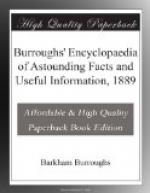There should be no antagonism between economy and a generous business policy. Narrow selfishness is to be avoided in the use of money or means. In buying goods, one should not take advantage of another’s necessities to beat him down to a figure which leaves him little or no profit, perhaps a loss, because he must have money. This is against manhood and is a ruinous policy, because it tends to picayunishness and chicanery. A sacred regard for the principles of justice forms the basis of every transaction, and regulates the conduct of the upright man of business.
[Illustration]
If economy is wealth, it is not so because of a niggardly and parsimonious policy. Perhaps the simplest, fewest and best rules for economical business are these, by observance of which a noted merchant amassed a large fortune: 1. Obtain the earliest and fullest information possible in regard to the matter in hand. 2. Act rapidly and promptly upon it. 3. Keep your intentions and means secret. 4. Secure the best [Transcriber’s Note: The original text reads ‘employes’] employees you can obtain, and reward them liberally.
Proprietors of institutions will early discover that order, and neatness, are necessary as economical agents in prosecuting a successful business. And the youth who would grow up to become well-to-do, to gain complete success, to be a valuable member and assume a position in society, should take pains to acquire habits of cleanliness, of order, and of business.
To this effect each one may early learn the simple rules of health and good order by paying reasonable attention to those so-called minor details, which pertain to the well-being of the person, and which must be faithfully observed in order to avoid failure and win success.
A person, young or old, in or out of business, may keep a memorandum-book in his pocket, in which he notes every particular relative to appointments, addresses, and petty cash matters. An accurate account of personal expenses should be kept, which should be balanced each week. By this means each individual will be more careful and economical in his expenditures, and generally live within his income. He must be reasonable in spending, or his memorandum or record-book, if it be honestly kept, will stand to his discredit.
A well-kept memorandum-book is often very useful, as it is very convenient, and sometimes serves to settle a troublesome query, arising in other minds, by which the possessor is absolved from the prejudice of doubt. Young people who expect to labor with their hands for what they have of this world’s goods, or rise by their own efforts, should by all means acquire habits of economy, learn to save, form correct habits, and no time will be required overcoming these. So surely as they do this, so surely will they be in a situation to ask no special favors. Every man wants to learn to look out for himself and rely upon himself. Every man needs to feel that he is the peer of every other man, and he cannot do it if he is penniless. Money is power, and those who have it exert a wider influence than the destitute. Hence it should be the ambition of all young men to acquire it, as well as to store their minds with useful knowledge.




